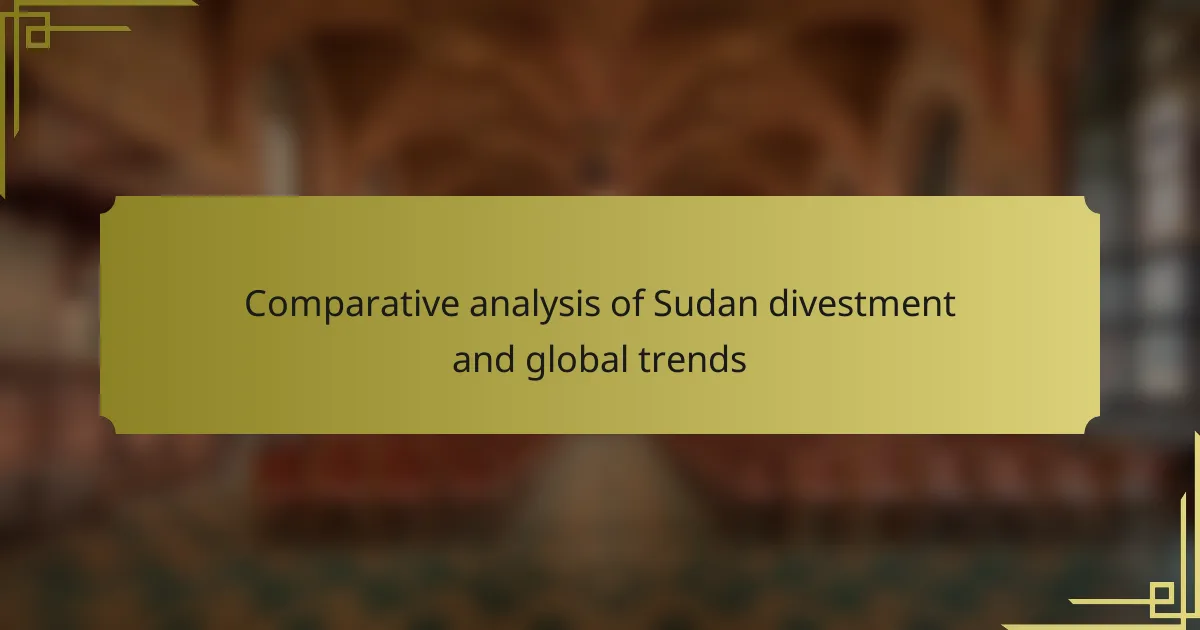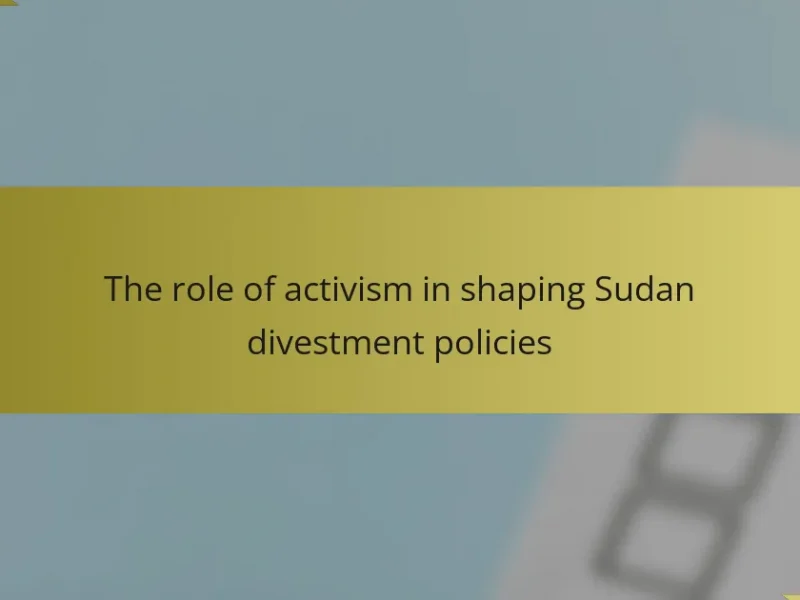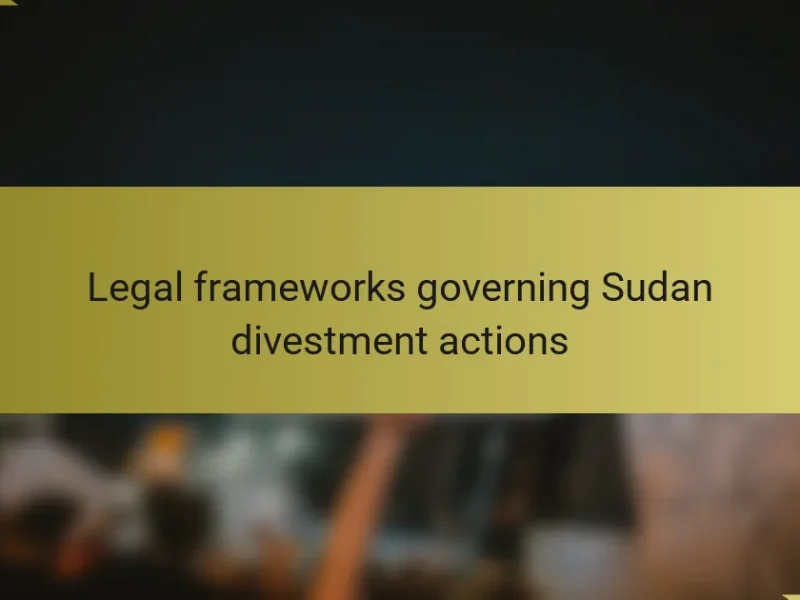Sudan divestment is a significant global movement aimed at addressing human rights violations in Sudan by encouraging investors to withdraw financial support from companies operating there. This divestment strategy has historically impacted economies of nations with poor governance, particularly highlighted during the Darfur genocide in the early 2000s. The article explores the key drivers of divestment, including human rights abuses, political instability, and economic sanctions, while also examining global trends in ethical investment practices. It highlights the increasing adoption of Environmental, Social, and Governance (ESG) criteria by institutional investors and the growing momentum of divestment campaigns targeting industries linked to human rights violations and environmental concerns.
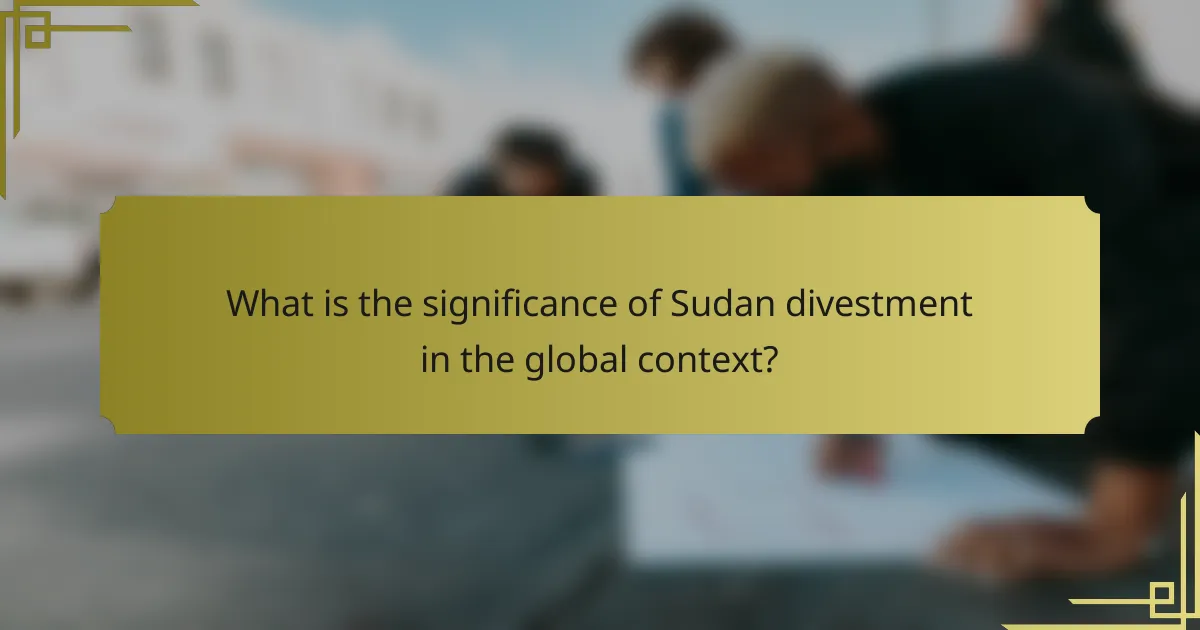
What is the significance of Sudan divestment in the global context?
Sudan divestment holds significant importance in the global context as it reflects international responses to human rights violations. This movement encourages investors to withdraw financial support from companies operating in Sudan. The aim is to pressure the Sudanese government to improve its human rights record. Notably, divestment actions have historically impacted the economy of countries with poor governance. For instance, in the early 2000s, divestment campaigns against Sudan gained momentum due to the Darfur genocide. These campaigns raised awareness globally and influenced policy changes. Many states and institutions adopted divestment policies, signaling a collective stance against human rights abuses. Thus, Sudan divestment serves as a model for global activism aimed at promoting ethical investment practices.
How does Sudan divestment reflect broader global trends?
Sudan divestment reflects broader global trends of socially responsible investing and ethical consumerism. This trend emphasizes the importance of aligning investments with moral and ethical standards. In recent years, many investors have chosen to divest from countries or entities associated with human rights violations or environmental degradation. For instance, the divestment movement against apartheid in South Africa serves as a historical parallel. The Sudan divestment movement gained momentum as international awareness of the Darfur conflict increased. This awareness led to calls for financial institutions to withdraw investments linked to the Sudanese government. The global divestment movement is not isolated; it is part of a larger push for accountability and sustainability in investment practices. In 2020, a report indicated that over $14 trillion had been committed to sustainable investment strategies worldwide. Thus, Sudan divestment exemplifies a significant shift towards prioritizing ethical considerations in global finance.
What historical events have shaped the divestment movement in Sudan?
The divestment movement in Sudan has been shaped by several key historical events. The Second Sudanese Civil War, which began in 1983, led to widespread human rights abuses. These abuses prompted international awareness and advocacy for divestment from companies operating in Sudan. The Darfur conflict, starting in 2003, intensified global scrutiny of Sudan’s government and its actions. This conflict resulted in significant humanitarian crises, further fueling divestment campaigns. In 2007, the United Nations and the African Union initiated peacekeeping efforts, highlighting the need for economic pressure through divestment. Legislative measures, such as the Sudan Accountability and Divestment Act of 2007 in the United States, formalized divestment as a tool against the Sudanese government. These events collectively galvanized public and institutional support for the divestment movement, aiming to hold the Sudanese regime accountable for its actions.
How do international relations influence Sudan divestment strategies?
International relations significantly influence Sudan divestment strategies. These strategies are shaped by diplomatic ties and economic sanctions imposed by foreign governments. For instance, countries with strong diplomatic relations may encourage investments, while those with strained ties often advocate for divestment. The U.S. sanctions against Sudan, particularly during the Darfur conflict, prompted many investors to withdraw. Additionally, international organizations and NGOs play a role in shaping public opinion, which can pressure companies to divest. As a result, Sudan’s divestment landscape is directly impacted by the geopolitical climate and the actions of other nations.
Why is Sudan divestment a focal point for ethical investment discussions?
Sudan divestment is a focal point for ethical investment discussions due to the country’s ongoing human rights violations. Investors and organizations seek to align their portfolios with ethical standards. Sudan has faced international scrutiny for actions such as genocide in Darfur and repression of dissent. This has led to calls for divestment from companies operating in the region. Ethical investors aim to avoid complicity in these abuses by withdrawing financial support. Additionally, divestment initiatives raise awareness about the impact of investments on human rights. Many universities and institutions have adopted divestment policies as a statement against these violations. Consequently, Sudan divestment serves as a critical case study in the broader movement for socially responsible investing.
What ethical considerations drive divestment from Sudan?
Ethical considerations driving divestment from Sudan include human rights abuses and genocide. The Sudanese government has been implicated in severe violations against its citizens, particularly in Darfur. These actions have led to widespread international condemnation. Companies and investors often seek to avoid complicity in such abuses. Economic sanctions and public pressure also influence divestment decisions. Furthermore, ethical investing principles emphasize social responsibility. Organizations aim to align their investments with values promoting peace and justice. This alignment helps mitigate reputational risks associated with supporting oppressive regimes.
How do investors assess the risks associated with Sudan investments?
Investors assess risks associated with Sudan investments through various analytical frameworks. They evaluate political stability, as Sudan has experienced significant unrest and conflict. Economic indicators, such as inflation rates and GDP growth, are also scrutinized. Investors analyze legal frameworks governing foreign investments in Sudan. Additionally, they consider the country’s compliance with international sanctions and regulations. Risk assessments often include environmental and social factors, given Sudan’s diverse challenges. Investors may rely on reports from organizations like the World Bank or the International Monetary Fund for data. Historical performance of sectors in Sudan may also influence investment decisions. These factors combined provide a comprehensive risk profile for potential investors.

What are the key drivers behind the divestment from Sudan?
The key drivers behind the divestment from Sudan include human rights violations, political instability, and economic sanctions. Human rights abuses, particularly in Darfur, have prompted international condemnation. The Sudanese government’s actions have led to widespread violence and displacement. Political instability has created an unpredictable business environment. Economic sanctions imposed by various countries limit investment opportunities. Companies often divest to align with ethical standards and avoid reputational risks. The combination of these factors has significantly influenced divestment decisions by foreign investors and corporations.
How do political factors contribute to divestment from Sudan?
Political factors significantly contribute to divestment from Sudan. International sanctions imposed by various countries impact foreign investments. These sanctions often arise from human rights violations and conflicts within Sudan. Political instability in the region creates an unpredictable business environment. Companies fear reputational damage associated with operating in such contexts. Public pressure from advocacy groups also influences corporate decisions to divest. For instance, campaigns highlighting Sudan’s political issues prompt companies to withdraw investments. The cumulative effect of these factors leads to a decline in foreign capital and economic support for Sudan.
What role do sanctions play in influencing divestment decisions?
Sanctions significantly influence divestment decisions by creating legal and financial risks for companies. When a country faces sanctions, businesses may choose to divest to avoid penalties. For instance, the U.S. imposed sanctions on Sudan, prompting many firms to withdraw investments. This withdrawal is often driven by the need to comply with international laws and avoid reputational damage. Additionally, sanctions can limit access to markets and resources, further incentivizing divestment. Historical data shows that companies often respond to sanctions by reassessing their investment strategies. The correlation between sanctions and divestment is evident in various case studies, including those involving Sudan.
How does the political climate in Sudan affect investor confidence?
The political climate in Sudan significantly undermines investor confidence. Frequent changes in government and ongoing civil unrest create uncertainty. Investors seek stable environments for long-term commitments. The lack of transparent policies further deters foreign investment. For instance, the 2019 ousting of President Omar al-Bashir led to economic instability. Additionally, ongoing conflicts in regions like Darfur heighten perceived risks. According to the World Bank, Sudan’s GDP contracted by 3.1% in 2020 due to these factors. Consequently, investors often view Sudan as a high-risk market. This perception limits foreign direct investment and economic growth opportunities.
What economic factors are impacting divestment from Sudan?
Economic factors impacting divestment from Sudan include instability, sanctions, and market accessibility. Sudan faces ongoing political instability, which deters foreign investment. Economic sanctions imposed by various countries limit financial transactions and trade. These sanctions affect the ability of companies to operate within Sudan. Additionally, the lack of infrastructure hampers business operations. Limited access to international markets further complicates investment opportunities. The volatile economic environment creates uncertainty for potential investors. Collectively, these factors contribute to a trend of divestment from Sudan.
How does the Sudanese economy influence foreign investment trends?
The Sudanese economy significantly influences foreign investment trends through its resource availability and regulatory environment. Sudan has abundant natural resources, including oil and minerals, which attract foreign investors seeking to exploit these assets. The economic stability and growth prospects of Sudan impact investor confidence. Political instability and economic sanctions can deter investment, as seen in the past years. Additionally, the government’s policies on foreign investment, including incentives and restrictions, shape the investment landscape. For instance, in 2020, Sudan’s removal from the U.S. list of state sponsors of terrorism improved its investment appeal. Thus, the interplay of resources, stability, and regulation defines foreign investment trends in Sudan.
What are the financial risks associated with investing in Sudan?
Investing in Sudan carries several financial risks. Political instability significantly impacts the investment climate. The country has experienced conflict and changes in government, creating uncertainty. Economic sanctions can limit market access and affect profitability. Currency volatility poses a risk to returns on investment. The Sudanese pound has seen significant depreciation, affecting foreign investments. Additionally, infrastructure challenges can hinder business operations. Limited access to financial markets complicates capital raising efforts. These factors collectively create a high-risk environment for investors.
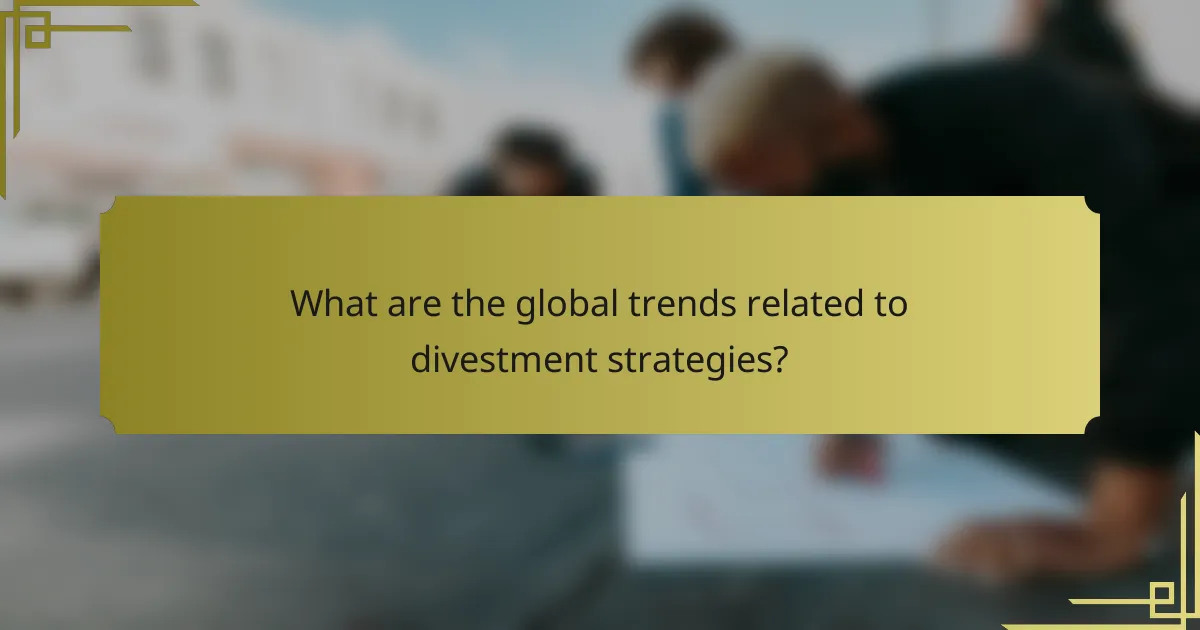
What are the global trends related to divestment strategies?
Global trends in divestment strategies include increasing pressure on companies to divest from fossil fuels and industries linked to human rights abuses. Many institutional investors are adopting Environmental, Social, and Governance (ESG) criteria to guide their investment decisions. For instance, a report by the Global Sustainable Investment Alliance indicates that sustainable investing reached $35.3 trillion in 2020, reflecting a 15% increase over two years. Additionally, divestment campaigns targeting sectors like tobacco and coal are gaining momentum, as seen in the rise of organizations like Divest Invest. Governments and universities are also committing to divestment, with over 1,300 institutions pledging to withdraw from fossil fuel investments as of 2021. This shift is driven by growing public awareness and activism surrounding climate change and social justice issues.
How do divestment strategies differ across various regions?
Divestment strategies differ across various regions based on economic, political, and social contexts. In North America, divestment often targets fossil fuels due to environmental concerns. For example, numerous universities have committed to divesting from coal and oil companies. In Europe, divestment strategies are influenced by regulatory frameworks promoting sustainability. Countries like Norway have established sovereign wealth funds that exclude certain industries. In Asia, divestment trends vary widely; some nations focus on human rights issues, while others prioritize economic growth. For instance, South Korea has seen movements against companies linked to unethical practices. In Africa, regional instability affects divestment strategies, with some countries seeing divestment as a tool for political leverage. Overall, regional differences reflect diverse priorities and motivations behind divestment actions.
What are the emerging patterns in global divestment movements?
Emerging patterns in global divestment movements include increased focus on fossil fuels and social justice. Many institutions are divesting from coal, oil, and gas to combat climate change. This trend is supported by the growing recognition of environmental, social, and governance (ESG) factors in investment decisions. In 2021, global divestment commitments surpassed $39 trillion, reflecting a significant shift in capital allocation. Universities, pension funds, and religious organizations are leading these efforts. Notably, the fossil fuel divestment movement has gained momentum since 2011, with over 1,500 institutions participating. Additionally, divestment campaigns are increasingly targeting industries linked to human rights abuses, such as fossil fuel extraction in conflict zones. This dual focus on environmental sustainability and social responsibility marks a significant evolution in global divestment trends.
How do social movements influence global divestment strategies?
Social movements significantly influence global divestment strategies by raising awareness and mobilizing public opinion. They advocate for ethical investment practices and highlight the social and environmental impacts of certain industries. For example, movements against fossil fuels have prompted institutions to divest from coal and oil companies. The global divestment movement gained momentum after the 2014 People’s Climate March, which saw over 400,000 participants. Research from the Global Divestment Mobilization indicates that over 1,200 institutions have committed to divesting from fossil fuels. This illustrates the tangible impact of social movements on investment decisions. As public pressure mounts, companies and governments often reconsider their financial ties to controversial sectors. This dynamic creates a ripple effect, encouraging others to adopt similar divestment strategies.
What can be learned from the comparative analysis of Sudan divestment and global trends?
The comparative analysis of Sudan divestment and global trends reveals critical insights into investment patterns and ethical considerations. It shows that divestment can influence political change by applying economic pressure. Historical examples, such as the divestment from South Africa during apartheid, support this notion. Furthermore, the analysis highlights the growing trend of socially responsible investing globally. Investors increasingly prioritize environmental, social, and governance (ESG) criteria in their decision-making processes. This trend reflects a shift in consumer preferences towards ethical investments. The case of Sudan illustrates the complexities of balancing profit and ethical responsibility in investment strategies. Overall, the analysis underscores the potential impact of collective divestment efforts on global human rights issues.
What best practices can be derived from successful divestment campaigns?
Successful divestment campaigns often employ clear communication strategies. They articulate specific goals and values to engage stakeholders effectively. Building coalitions enhances credibility and broadens the support base. Mobilizing grassroots activism increases visibility and pressure on targeted entities. Utilizing data-driven arguments strengthens the case for divestment. Transparency in decision-making fosters trust among supporters. Continuous engagement with the community sustains momentum throughout the campaign. Lastly, leveraging media coverage amplifies the campaign’s message and reach. These practices have been observed in various successful campaigns, demonstrating their effectiveness in achieving divestment goals.
How can investors make informed decisions regarding Sudan divestment?
Investors can make informed decisions regarding Sudan divestment by conducting thorough research on the country’s political and economic climate. Understanding the ongoing conflicts and human rights issues is crucial. Investors should also analyze the implications of international sanctions and their impact on business operations in Sudan. Reviewing reports from organizations like the United Nations and Amnesty International provides valuable insights. Additionally, consulting with financial analysts who specialize in emerging markets can guide investment strategies. Monitoring global divestment trends can help investors align their decisions with ethical investment practices. Engaging with local experts in Sudan can further enhance understanding of the market dynamics.
The main entity of the article is Sudan divestment, which is examined within the broader context of global divestment trends. The article explores the significance of Sudan divestment as a response to human rights violations, particularly in relation to the Darfur conflict, and its influence on ethical investment practices worldwide. Key topics include the historical events shaping the divestment movement, the impact of international relations and sanctions, and the ethical considerations driving divestment decisions. Additionally, the article analyzes how investor confidence is affected by Sudan’s political and economic climate, along with emerging global trends in socially responsible investing.
